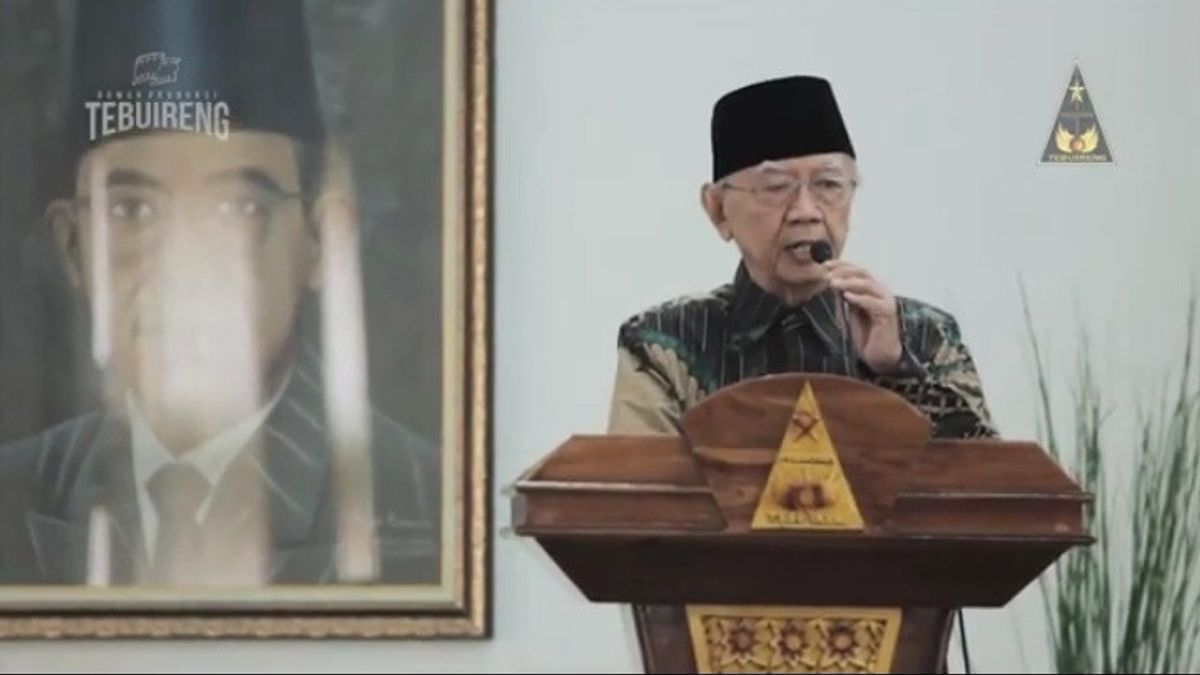JAKARTA - The death of KH Salahuddin Wahid or familiarly known as Gus Sholah also invited grief to his family, friends, and those closest to him. No exception for the santri and mualim at the Tebuireng Islamic Boarding School, which since 2006 has been under the care of the deceased. Because, there are several teachings brought by each boarding school leader. Gus Sholah is one of the people who revitalized one of the oldest Islamic boarding schools in Indonesia.
Apart from being known as a 'struggle pesantren' and giving birth to national heroes, the Tebuireng Islamic Boarding School also has a role in economic development and shaping the nation's civilization. This Islamic boarding school also serves as a character and moral builder for the community, as well as strengthening the national insight by making the society democratic and accustomed to living in diversity.
Tebuireng is located at kilometer 8 from the City of Jombang. In an area of 311 hectares, a famous scholar named Hasyim Asy'ari - who is the founder of the largest Islamic organization in Indonesia Nahdlatul Ulama - founded a pesantren on August 3, 1899.
As Syamsul Ma'arif et al wrote in the Inclusiveness of the Tebuireng Islamic Boarding School: Looking at Globalization with the Face of Traditionalism (2015), the view that has always been used by the Tebuireng Islamic Boarding School is al-Muhafadlatu'ala qadimi al-shalih wa al-akhdzu bi al-jadidi al-ashlah. With this concept, Pesantren Tebuireng is of the view that responding and fostering change is a necessity. Because everything in this world is considered to flow and all changes according to the era.
Hasyim as the caretaker of the Tebuireng Islamic Boarding School in the first period (1899-1947) has laid the foundations for the spirit of humanism and pesantren inclusiveness. He himself composed a number of books, one of which became a reference in the pesantren, namely, al-Tibyan fi al-Nahyi'an muqatha'ati al-Arham wa al-Aqarib wa al-Ikhwan which contained the importance of maintaining silaturrahmi (brotherhood) and its dangers. breaking the ties of brotherhood.
Hasyim's spirit of openness and his struggle to uphold religious values for humanity, then inspires and sprinkles the spirit of reform in the following generations.
The values taught by Hasyim have become a kind of culture and local wisdom that is passed down from one generation to the next. This has continued until the present period, which is often referred to as the period of revitalization under Gus Sholah. Gus Sholah was a very well known man who was broad-minded, open, egalitarian and simple.
Since 2006 until now, Pesantren Tebuireng has been under the tutelage of Gus Dur's younger brother, KH. Sholahuddin Wahid (Gus Sholah) who is well known as a human rights activist and fighter and has served as deputy chairman of the National Commission on Human Rights.
The following are the teachings inherited from a Gus Sholah. The first is to strengthen friendship and dilute exclusivity.
Strengthen friendship and dilute exclusivity
Seeing the important role of friendship for the creation of unity and integrity. Tebuireng, under the auspices of Gus Sholah, has also developed a gathering agenda, both in the form of halalbihalal which is internal to the pesantren family and with the students which is called a reunion.
All of that is in order to realize the teachings of Hashim in his book al-Tibyan fi al-Nahy'an Muqatha'ah al-Arham wa alAqarib wa al-Ikhwan which explains the prohibition of cutting ties with family, relatives and friends.
Gus Solah in his interview said that he was the one who pioneered the initiation of the halalbihalal bani Asy'ari (father of KH. Hasyim Asy'ari). "I myself had the idea of holding a halalbihalal for the children of Asy'ari and 700 people attended," he said in an interview quoted by Ma'rif.
By paying attention to the positive role of this friendship, Gus Solah wishes to expand its meaning, from just personal friendship, to large-scale social and business cooperation. Therefore, the reunion program entitled Tebuireng Islamic Boarding School Alumni Gathering has been held regularly since 2006 and is always held on the last Saturday of Shawwal.
The practice of silaturrahmi which is applied at the Tebuireng Islamic Boarding School is not only for internal circles, but is widely opened to the community as a whole. Various guests from various backgrounds are allowed to attend. Both from ordinary people, politicians, officials, and artists.
Once, as Gus Solah confessed, "The priests stayed here for several weeks with the intention of studying Islamic teachings at the pesantren."

Upholding the value of tasamuh (tolerance)
The value that Gus Sholah introduced in Tebuireng was tasamuh or tolerance. Tasamuh is an attitude to be able to respect and appreciate differences, both in terms of religion, culture and ethnicity. More clearly, Gus Sholah defines the tasamuh that he wants to implement in Tebuireng as being generous, caring, tolerant, non-violent, and respecting differences and respecting the rights of others. One of Hasyim's teachings that he always exemplifies to his students.
Meanwhile, in order to realize the tasamuh attitude of the students, kiai as a key factor in the pesantren need to set an example of how to be tolerant towards others. Based on this principle, Gus Sholah did a lot of cooperation, dialogue, and even visited the sick even with people of different religions.
"The difference is still different, don't be confused. Even though we believe that our religion is the right one, we have no right to blame," said Gus Sholah.
In addition, the tasamuh attitude is also manifested by not allowing violence in the teaching process. At the Tebuireng Islamic Boarding School, according to Gus Sholah, non-violence education was always instilled. "Here are given quite harsh sanctions against santri / students who commit acts of violence," said Gus Sholah.
Keep up the tradition
Although many revitalizations were carried out in Tebuireng, the pesantren still did not lose its locality character to continue the tradition of teaching and learning methods initiated by Hasyim. One of them is the education system which is known as sorogan and bandongan.
One of the reasons why the learning system using the yellow book is still maintained is in order to maintain the identity of the students as people who are specially prepared to master the religious sciences.
This sorogan system, comes from the word sorog (Javanese) which means to proffer. Each student faces and hands his / her book in front of the kiai or the badminton individually. The method that was introduced by Idris Kamali, according to Gus Solah, was inspired by Imam Malik's teaching pattern, was carried out independently and sustainably and emphasized personal initiative and discipline.
The educational methods used by Idris at that time were very successful. Because they are able to produce kiai, or at least religious teachers and preachers are influential in society.
Besides sorog, there is also the weton method. Weton comes from the Javanese word wektu which means time. Meanwhile in West Java this method is known as bandongan. This name was given because the recitation was carried out at certain times, usually before or after the fardu prayer.
Now, all efforts are left to continue. Gus Sholah died at the age of 77 after undergoing treatment at the Harapan Kita Heart Hospital, Jakarta, Sunday, February 2 evening. Gus Sholah's body was buried at the Tebuireng Islamic Boarding School, one complex with his older brother, Abdurrahman Wahid or Gusdur.
The English, Chinese, Japanese, Arabic, and French versions are automatically generated by the AI. So there may still be inaccuracies in translating, please always see Indonesian as our main language. (system supported by DigitalSiber.id)













